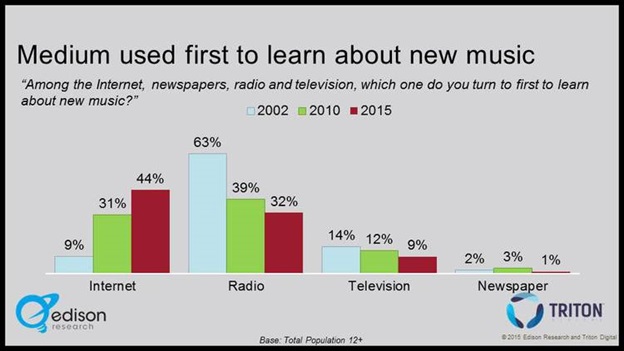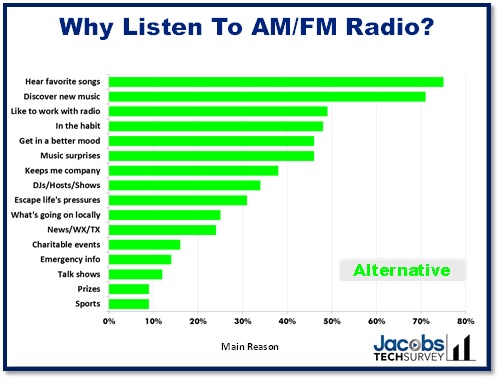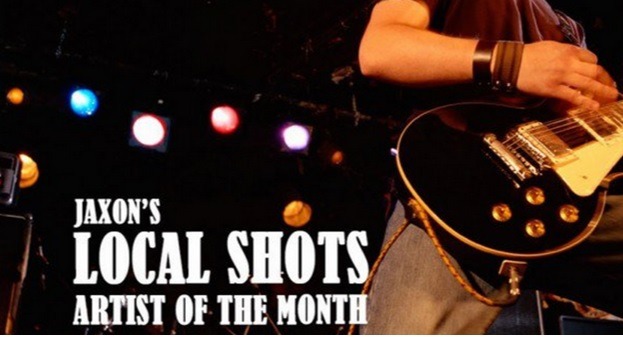No one loves a serious research conversation more than Larry Rosin and me. When we first met, Larry had just started up Edison Research and we worked together at WBOS/Boston back when it was a Triple A station. Over the years, we have sat in what seems like hundreds of conference rooms, staring at data slides, trying to determine what they all mean.
We also have spent considerable time talking about more macro research issues, and what they might mean to the radio industry, as well as mass and digital media in general. As we can probably all agree, there’s never been a time when we’ve had so much data. Unfortunately, much of it is conflicting, incomplete, or otherwise perplexing. And that’s where experience and interpretation come into play..
Larry’s recent blog post about music discovery, culled from his great Infinite Dial research studies, addresses the issue of music discovery and whether radio is winning or losing that war. His conclusion is that while the Internet has surpassed radio for music discovery, Marconi’s medium has derived value from the audience “learning where the hits are.” Thus, radio may be moving to a place where listeners once learned about what was new, but has now become a destination that shows us what’s popular.
Our Techsurvey’s are similar in many ways to Edison/Triton’s Infinite Dial studies. We ask a lot of the same questions, but utilize very different sample bases. If you think of these two research franchises as concentric circles, the Infinite Dial’s national study, sampled to match the U.S. population, is the larger circle. Techsurvey’s sample – respondents mostly from radio station email databases – is the inner circle, comprised of those who are most avid and regular users of the medium. In focusing on both studies, we get a glimpse of two fascinating sides of the audience.
And while our Techsurveys also indicate that radio as a new music exposure medium has certainly had better years (and it’s much worse among younger listeners), for certain formats, music discovery still very much matters.
Here’s a “Why radio?” chart among fans of the Alternative format that shows that hearing their favorite songs (reinforcing Larry’s point) tops the list of main reasons, followed closely by music discovery.
So how should programmers interpret this data in light of these findings that many core listeners still value music discovery on the radio even when they’re more wandering off to the Internet to learn what’s new. Aren’t these findings at odds with one another, given the rising levels of young people seeking new music outside of radio, while continuing to point to music discovery as a key driver in listening to broadcast radio in the first place?
And is radio condemned to simply “play the hits” while letting fans experience the joys of music discovery on channels like Pandora, Spotify, Shazam, and Beats1?
Perhaps the answer for many stations is to do both – play the best songs in the format and contextualize them (think Casey Kasem), but also develop and nurture a reputation for music discovery.
The former is easy because radio does this all the time. And guided by callout research and other feedback tools, most stations that make new music a priority know how to create playlists that reflect the big songs that are popular and creating buzz.
But the discovery piece is a tougher putt for broadcast radio because new music is seemingly everywhere. There are infinite sources of discovery channels, from Pandora to Facebook to artist web sites to Shazam that are now successfully invading a space that radio once owned.
So perhaps for radio, the key to music discovery is doing it differently…and creatively.
That is, the Internet generally provides the robotic, algorithmic machine that points fans in the right direction. But only broadcast radio has the ability to provide context, entertainment value, a local sense of place, and the ability to put it in perspective.
Hopefully, the next time a jock says, “Here’s the new one from the Foo Fighters,” there’s a PD out there making sure that doesn’t happen again because it accomplishes nothing. Broadcast radio is now tasked with re-evaluating and redefining what music discovery means, and how to present it in a way that makes it truly different from what YouTube and Pandora are offering.
Some of the best radio segments I’ve heard is when personalities take an interest in the music, show their fandom, and present a different side of the music that is all around us.
This could mean NPR’s Terry Gross’ Fresh Air show presenting an in-depth interview with an artist unlike anything even core fans have experienced.
That’s discovery.
It could mean finding a talent like Christian Hand, who makes regular appearances on KSWD’s (Entercom/L.A.) Mark In The Morning Show, breaking down songs track by track in a style that is riveting.

That’s discovery.
It could mean doubling down on local music like WMMR’s (Greater Media/Philadelphia) Jaxon does with his Local Shots – Artist of the Month on-air/web feature.
That’s discovery.
It could be in-studio sessions with bands for small groups of fans (or streamed live online) like KNDD’s (Entercom/Seattle) End Sessions.
It could be about creating unique activities with artists when they come to town, like how KNRK (Entercom/Portland) gave listeners a chance to shoot hoops with Imagine Dragons.
That’s discovery.
It could be a weekly newsletter similar to what 91X (Local Media San Diego) does every week with curated links to new songs and artists.
That’s discovery.
It could be a show like Sat Bisla’s Passport Approved, highlighting new music from around the globe.
Yes, these are all great music discovery techniques because they create unique experiences and buzz.
For radio, the “That was/this is” days are over.
It’s time to get serious about discovery.
Disclosure: KNDD, KNRK, 91X, WMMR, and KSWD are all Jacobs Media clients.
- Media In 2025: Believe It Or Not! - January 15, 2025
- Every Company Is A Tech Company - January 14, 2025
- The Changing Face Of Social Media (OR WTZ?!) - January 13, 2025









Great post (as usual). Proust said something like discovery consists not only in seeking new landscapes, but in having new eyes. We could all use a heaping dose of both.
Indeed we could. Thanks for the kind words and reading our blog.
We learned very quickly that we must explore new tracks, songs and trends in this unstoppable avalanche, much more effectively; not only to be the first and leading “discoverers” but to give them the life they deserve useful and highlight them above current successes presenting them with imagination, linking them to experiences that emotionally impact only with accompanying us as storytellers from Radio can provide.
Such a hard task as pleasant provides unique rewards each season. Please enlighten and encourage … with all this information, where we always see opportunities to evolve to improve !!